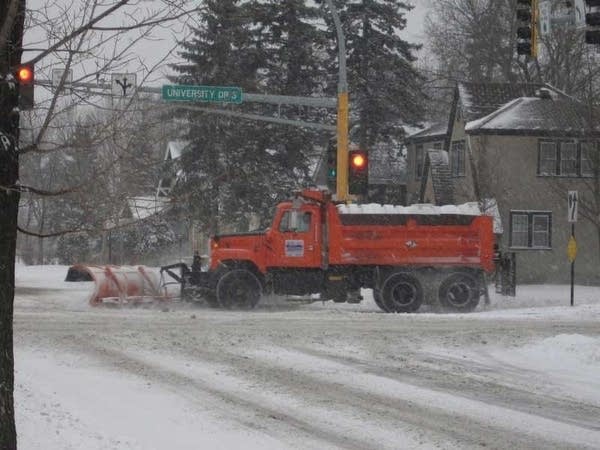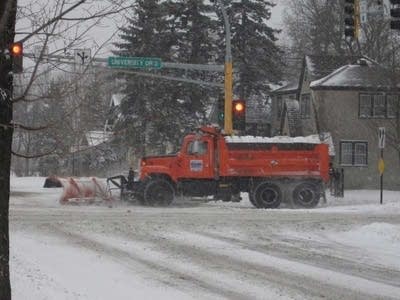Cities scramble to trim budgets as state cuts loom

When he answered the phone at Chatfield city hall the other day, City Clerk Joel Young was poring over the city budget, line by line.
Can the city put off repairing streets? Or replacing that 15-year-old truck? How about that contract for cleaning carpets in city hall? Every cut has consequences.
"Are you doing something that will further deteriorate your local economy? You've got to be careful, that penny-wise, pound-foolish thing," said Young.
Young is president of the Association of Small Cities and he said the same budget dissection is happening across the state.
Create a More Connected Minnesota
MPR News is your trusted resource for the news you need. With your support, MPR News brings accessible, courageous journalism and authentic conversation to everyone - free of paywalls and barriers. Your gift makes a difference.
Most cities have already absorbed a cut in state funding. Last month the governor slashed local government aid to help balance the current state budget. Cities typically tapped budget reserves to replace the state money.
"No one thinks there will be a normal anymore. So the question is, what do we do and how do we do it?"
But with the state grappling with a shortfall projected near $5 billion, Joel Young said cities expect the next round of cuts to be far deeper than can be covered by budget reserves.
He said people living in small towns should expect budget cuts that are both deep and long-term.
"It's one thing to come up with strategies that will get us through '08, '09, '10, and then things will return to normal," said Young. "But no one thinks there will be a normal anymore. So the question is, what do we do and how do we do it?"
For cities, the 2009 budget year has started. Wadena Mayor Wayne Wolden is president of the Coalition of Greater Minnesota Cities. He said city leaders around Minnesota know state aid will be cut, but they don't know how deep the cuts will be.
"Statewide you have councils that are meeting feverishly to identify savings and implement those savings right now, before they commit themselves to the rest of the year," he said.
Wolden said street repairs, building maintenance and city workers are all potential targets. He said the choices city leaders have to make are difficult.
Do they close the airport that helps bring in business? Do they stop paying for amenities that residents want? Wolden said the city may not hire workers to mow parks in the summer. Or maybe they'll need to kill a project that takes a big chunk of the city park budget.
"It costs $50,000 for an average set of playground equipment now. You could cut that playground equipment," Wolden said. "The rest of the story is that we've been saving for it for four years. We have a group of Boy Scouts lined up to install it. And now we're saying, 'Sorry, it's gone.' That's what sits on the shoulders of city councils around the state."
Wadena, where Wayne Wolden is mayor, gets fully half of its budget from local government aid. That funding is likely to be slashed as the governor and lawmakers try to close the state's budget gap.
Wolden believes taxpayers won't accept higher property taxes, and that means cuts in core city services. Wolden said cities are struggling with Gov. Pawlenty's admonition not to cut budgets for public safety.
"We understand that. We're not dumb. We know that people want to dial 911 and have somebody show up at their door in 60 seconds, 24/7/365. It's what we do. That's why they pay taxes," Wolden said. "We are going to try to hold them as harmless as possible. But this is forcing our hand. This may have to be the cut."
Wolden said he's trying to keep a positive attitude and use the budget crisis as an opportunity to make city government more efficient.
Chatfield City Clerk Joel Young said he's hopeful local residents will tell city leaders what services they consider most important, and how much they are willing to pay for those services.
But Young said tough times remind him why he chose a career in public service.
"One of the reasons most of us are in this business is because we like to make a difference," said Young. "When you realize the decisions might not be very fun or easy, you know the decisions impact the lives of your family, your friends and your neighbors -- now you know you're doing something worthwhile. So to that extent, it's not all bad."
Young says he doesn't know what his city's government will look like in two years or four years. But he expects it will be a much leaner operation, offering city residents fewer of the services they've come to expect.
